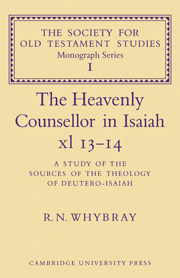Book contents
- Frontmatter
- Contents
- Acknowledgements
- Abbreviations
- Introduction
- I The context
- II Detailed interpretation
- III Literary characteristics
- IV Israelite kings and their councils
- V The origin of the divine council
- VI The assembly of the gods in Canaan
- VII The council of Yahweh in Israel
- VIII Yahweh and his advisers
- IX The office of counsellor
- X The divine counsellor in Babylonian myth
- XI Summary and conclusions
- Index of biblical references
- Index of authors cited
- Frontmatter
- Contents
- Acknowledgements
- Abbreviations
- Introduction
- I The context
- II Detailed interpretation
- III Literary characteristics
- IV Israelite kings and their councils
- V The origin of the divine council
- VI The assembly of the gods in Canaan
- VII The council of Yahweh in Israel
- VIII Yahweh and his advisers
- IX The office of counsellor
- X The divine counsellor in Babylonian myth
- XI Summary and conclusions
- Index of biblical references
- Index of authors cited
Summary
First it is necessary to examine the context of thought in which these verses are set. Many of the older scholars1 regarded verses 12–31 as a literary unit, whether independent or not, mainly on the basis of their contents and style: the prophet here reasons with his audience, seeking to convince them of Yahweh's claim to total sovereignty. The use of the argument from creation and of the question form throughout the passage clearly distinguishes verses 12–31 both from what precedes and from what follows. Others made a division between verse 26 and verse 27, recognising that the specific address to Jacob/Israel and the complaint about God's apparent injustice in verse 27 mark the beginning of a new section.
Within verses 12–26 (or 12–31) the older commentators generally recognised shorter sections, each presenting a particular aspect of the prophet's argument. But it was not until the techniques of form criticism were applied to Deutero-Isaiah that the possibility was envisaged that these shorter sections might in fact have originally been independent units.
Gressmann, the first to apply form critical methods, did not reach this conclusion because the hymnic themes and language which he identified here led him to classify the whole of verses 12–26 as a Hymn linked with a word of consolation (Trostwort, verses 27–31) to form a single composition. It was Köhler, with a more precise understanding of individual forms, who narrowed the context, classifying verses 12–16 as a Disputation (Streitgespräch), a type of argument based on the forms of legal dispute in use in the administration of justice in the gate, a form which had already been used by some of the pre-exilic prophets.
- Type
- Chapter
- Information
- The Heavenly Counsellor in Isaiah xl 13-14A Study of the Sources of the Theology of Deutero-Isaiah, pp. 4 - 9Publisher: Cambridge University PressPrint publication year: 1971



